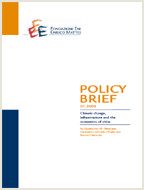Moral values and financial markets: Islamic finance against the financial crisis?
Islamic finance is one of the fastest growing financial industries in the world, and its total assets are estimated to exceed $700 billion (Standard & Poor’s 2009). The rise of Islamic finance comes along with opportunities and challenges. Muslim economists believe that the moral economy of Islam can contribute to strengthening the ethical foundations of capitalism against reckless behaviours, while adopting Islamic financial products, e.g. sukuk (Islamic bonds), is seen as a way for non-Muslim governments and institutions to attract foreign capital, much needed in times of liquidity crunch and economic slowdown. On the other hand, Islamic finance attracts suspicion for its alleged links with Islamist political movements and terrorist groups. Moreover, several Muslim economists wonder whether the Islamic financial industry is consistent with the moral teachings of Islam, and it is questionable whether the Islamic financial system has been more resilient to the economic crisis than the conventional one. Indeed, it could be that Islamic finance is affected by the very same flaws of conventional financing methods, such as speculative investment behaviour and accountability and transparency issues. This policy brief aims to provide policy makers and investors with the state-of-the-art of Islamic finance, pinpointing the main policy challenges.

